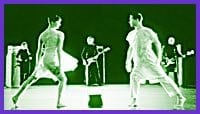Dance, of course, is dance. So it’s hardly surprising that there are all sorts of goodies of particular interest to queer audiences in the Moving Pictures Festival Of Dance On Film And Video, which returns for its 10th year next week.
One of the more striking films in the festival is Sophie Fiennes’s The Late Michael Clark, a documentary looking at the life of dancer and choreographer Michael Clark as he returns to the stage with a new work (called Current/See) after beating his heroin addiction.
For those unfamiliar with Clark, he was the bad boy of British modern dance, and is especially well known for a performance in a London gallery during which he had sex with the US dancer Stephen Petronio.
What is lovely about this doc is that Fiennes constructs it to reflect the way that Clark develops and executes his choreography. When asked in a radio interview whether he thinks dance works literally tell their narratives through movement, Clark says he thinks his audience is conscious and prepared to follow him, making the need for literal moments effectively unnecessary.
Fiennes’s film operates along the same lines. There is no step-by-step account of Clark’s life as he emerged from rehab to work again; instead, we are presented with a languid, non-linear montage of Clark during rehearsals, at creative moments, doing his laundry and appearing at a press conference.
These scenarios are often put together using seemingly spontaneous close-ups of body parts and unstable, handheld panning shots. This dissection of space and the body makes the film very dance-like in itself, focussing on the fleeting details of bodies in motion.
Fiennes introduces a vague but charming motif: She often shows moving hands – the hands of a dance coach, the hands of a ticket seller – making the most mundane of bodily tasks seem lithe and graceful.
The film also captures a good deal of Clark’s dance piece; Fiennes uses very simple framing and long takes. This allows the performance to sit nicely in balance with the shifting, unfocussed camera of the film’s other segments. Fiennes is careful not to allow these portions of the film lapse into filmed theatre – one imagines that her work assisting Peter Greenaway on lavish works like Prospero’s Books (which also featured Clark as a delightfully slimy Caliban) taught her how to keep a languishing shot brimming with excitement.
Unlike the biographies A&E has made so familiar, here we get no broad statements, no star-struck mooning, no pity for the poor ex-junkie. In the end, we feel that we have been presented with a satisfyingly incomplete portrait of a rather charming man as he goes about the work he loves, as well as a look at some stunning dance work.
The Late Michael Clark screens at 8:30pm on Tue, Oct 30 at the Rivoli (332 Queen St W).
Moving Pictures.
$8 per screening.
Mon, Oct 29-Nov 3.
Various locations.
(416) 961-5424.
Other queer offerings at Moving Pics include shorts by Roy Mitchell, Michael Brynntrup and Wrik Mead; check out www.movingpicturesfestival.com for times and locations. On top of that, there’s Moze Mossanen’s The Rings Of Saturn, an hour-long contemporary ballet specifically choreographed by Robert Desrosiers for the screen, featuring Rex Harrington and, imagine, Sonja Smits; it screens at 8pm on Wed, Oct 31 at the Bloor (506 Bloor St W).
The opening night Nureyev Gala features rare film footage and appearances by Veronica Tennant, Frank Augustyn, Linda Maybarduk, Vanessa Harwood and other friends of Nureyev, beginning at 7:30pm on Mon, Oct 29 at The Studio Theatre (235 Queens Quay W); advance tickets to the benefit are $45.

 Why you can trust Xtra
Why you can trust Xtra


